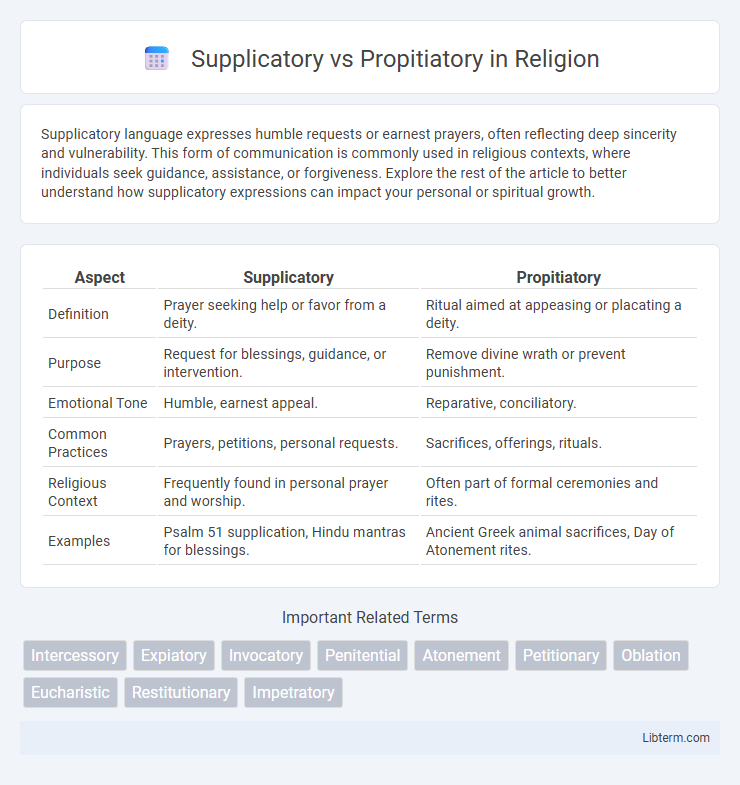Supplicatory language expresses humble requests or earnest prayers, often reflecting deep sincerity and vulnerability. This form of communication is commonly used in religious contexts, where individuals seek guidance, assistance, or forgiveness. Explore the rest of the article to better understand how supplicatory expressions can impact your personal or spiritual growth.
Table of Comparison
| Aspect | Supplicatory | Propitiatory |
|---|---|---|
| Definition | Prayer seeking help or favor from a deity. | Ritual aimed at appeasing or placating a deity. |
| Purpose | Request for blessings, guidance, or intervention. | Remove divine wrath or prevent punishment. |
| Emotional Tone | Humble, earnest appeal. | Reparative, conciliatory. |
| Common Practices | Prayers, petitions, personal requests. | Sacrifices, offerings, rituals. |
| Religious Context | Frequently found in personal prayer and worship. | Often part of formal ceremonies and rites. |
| Examples | Psalm 51 supplication, Hindu mantras for blessings. | Ancient Greek animal sacrifices, Day of Atonement rites. |
Understanding Supplicatory and Propitiatory: Definitions
Supplicatory prayers involve humble requests or pleas made to a deity, expressing dependence and seeking mercy or assistance. Propitiatory prayers aim to appease or satisfy a deity's anger or wrath, often to restore favor and prevent punishment. Both forms reflect different relational dynamics between humans and the divine in religious practices.
Historical Roots of Supplication and Propitiation
Supplication and propitiation have deep historical roots in ancient religious practices where supplication involved earnest prayers or appeals for mercy and assistance from deities, often seen in early Mesopotamian and Egyptian rituals. Propitiation, by contrast, focused on appeasing gods through offerings or sacrifices to avert divine wrath, prominently featured in Greco-Roman and Hebrew traditions. These differing approaches reflect distinct theological perspectives on human-divine relationships and the means of seeking favor or forgiveness.
Theological Perspectives on Supplicatory vs Propitiatory Prayers
Theological perspectives distinguish supplicatory prayers as humble requests seeking divine intervention or assistance, while propitiatory prayers aim to appease or satisfy divine wrath and restore favor. Supplicatory prayers emphasize faith and dependence on God's mercy, whereas propitiatory prayers focus on atonement and reconciliation for sins or offenses. Both types reflect different aspects of human-divine relationships, highlighting contrasting dimensions of petition and expiation within religious traditions.
Key Differences Between Supplicatory and Propitiatory Practices
Supplicatory practices involve humble requests or prayers seeking divine assistance or favor, emphasizing a plea for mercy or help without necessarily addressing past wrongdoings. Propitiatory practices focus on appeasing or placating a deity by offering sacrifices or rituals intended to atone for offenses, aiming to restore harmony and prevent divine wrath. The key difference lies in supplication's orientation towards petition and dependence, while propitiation centers on reconciliation and expiation of guilt.
Scriptural References for Supplicatory and Propitiatory Acts
Supplicatory acts in scripture often involve earnest prayer and petitions, such as David's Psalms (Psalm 51) and Jesus' prayers in Gethsemane (Luke 22:42), expressing deep reliance on God's mercy and intervention. Propitiatory acts, emphasizing appeasement of divine wrath, are exemplified in the Old Testament sacrificial system (Leviticus 16) and the New Testament's portrayal of Christ's atoning sacrifice (Romans 3:25), demonstrating reconciliation through sacrifice. Both forms reveal distinct yet complementary aspects of human-divine interaction based on either pleading for grace or offering satisfaction for sin.
Supplicatory Prayers: Purpose and Examples
Supplicatory prayers are earnest requests directed to a higher power, seeking assistance, guidance, or blessings in times of need and vulnerability. These prayers emphasize humility and dependence, often found in religious traditions like Christianity, Islam, and Hinduism, with examples including the Lord's Prayer and the Islamic Du'a. Their primary purpose is to express devotion and appeal for mercy, healing, or intervention, reflecting a personal and intimate communication with the divine.
Propitiatory Prayers: Meaning and Context
Propitiatory prayers are intended to appease a deity or divine being by seeking forgiveness, favor, or intervention in times of distress or moral failure. These prayers often involve acknowledging wrongdoing and offering sincere repentance to restore a harmonious relationship with the divine. In religious contexts, propitiatory prayers emphasize the importance of reconciliation and divine mercy to obtain spiritual cleansing and protection.
Cultural Interpretations Across Religions
Supplicatory prayers emphasize humble requests and dependence, commonly found in Christianity and Islam, where believers seek divine intervention or mercy. Propitiatory rituals aim to appease or placate deities to gain favor or avoid wrath, prevalent in ancient Greek, Roman, and Hindu practices involving offerings or sacrifices. These differing approaches reflect cultural interpretations of the divine-human relationship, influencing how communities express reverence and seek spiritual outcomes.
Modern Applications of Supplicatory and Propitiatory Practices
Supplicatory practices in modern contexts often involve personal prayers or appeals for guidance, healing, and support seen in therapeutic settings and mindfulness routines. Propitiatory practices focus on rituals or offerings intended to appease perceived spiritual forces or restore balance, commonly observed in cultural ceremonies and environmental conservation initiatives aiming to honor natural elements. Both forms are integrated in contemporary religious and secular frameworks to address psychological well-being and communal harmony.
Supplicatory vs Propitiatory: Choosing the Appropriate Approach
Supplicatory prayers emphasize humble requests for divine help or mercy, highlighting human dependence and sincerity in seeking assistance. Propitiatory prayers aim to appease or satisfy divine anger through offerings or rituals, focusing on restoring divine favor and preventing punishment. Choosing between supplicatory and propitiatory approaches depends on the context, intention, and desired relationship with the divine, where supplication fosters communion and propitiation seeks reconciliation.
Supplicatory Infographic

 libterm.com
libterm.com